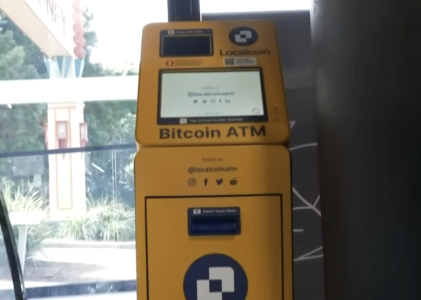
It starts like any ordinary day at a suburban supermarket. Shoppers line up at the checkouts, some pausing at a sleek new kiosk offering something unfamiliar—a cryptocurrency ATM. For many, it looks harmless enough. Yet behind the flashing screen and simple instructions lies a system increasingly linked to scams, heartbreak, and lost savings.
AUSTRAC fines crypto ATM operator
Australia’s financial crimes regulator has taken decisive action against a second cryptocurrency ATM operator, warning that these machines have become a major money-laundering risk.
On Thursday, AUSTRAC fined Queensland-based Cryptolink $56,340 for failing to report large cash transactions and for weaknesses in its anti-money-laundering controls.
‘The undertaking requires Cryptolink to appoint a third party to review its systems and processes, including controls for high-value cash transactions and proper risk assessments,’ AUSTRAC general counsel Tim Lear said.
Cryptolink, which operates 97 machines nationwide, said it had cooperated with AUSTRAC to resolve the matter.
‘While we regret the shortcomings that led to this outcome, we are focused on strengthening our systems and controls to build a more robust, resilient and trusted platform,’ a company spokesperson said. ‘The outcome with AUSTRAC, though serious, reflects a fair approach by the regulator, and we appreciate their willingness to engage constructively.’
Dorothy’s story: how one scam stole her savings in minutes
For Perth pensioner Dorothy Dyall, 72, the crackdown arrived far too late.
In April, she was at home when a loud alarm blared from her computer. ‘Suddenly, there was a very loud alarm, like a fire alarm,’ she said.
A man claiming to be from Microsoft Security told her her computer had been hacked and used to access illegal websites.
‘I was shocked. I’m an ex-nurse and just wanted to help them catch whoever did it,’ she said.
Over several phone calls lasting four hours, the scammers posed as both Microsoft staff and her bank, instructing her to withdraw $12,500 in cash and tell bank staff she was buying a second-hand car.
They then directed her to deposit the money into a crypto ATM operated by Localcoin inside her neighbourhood supermarket. ‘I was told not to talk to anyone and just to put the cash in,’ Ms Dyall said. ‘As soon as I got home, I realised I’d been scammed.’
Ms Dyall reported the incident to police but the funds could not be recovered. With help from City of Cockburn financial counsellor Colleen Crowley, she later received a $1,000 goodwill payment from her bank.
Both women are now calling for crypto ATMs to be banned.
‘They’re literally everywhere,’ Ms Dyall said. Ms Crowley added that customers should be reimbursed for crypto ATM losses, saying, ‘We need to stop placing the burden and the blame on consumers.’
Crypto ATMs: a growing target for scammers
Australians lost an estimated $3 million to crypto ATM scams in the 12 months to January, according to the Australian Cyber Security Centre.
Authorities believe the true figure is much higher because many victims never report the crime.
The most frequent ATM users are over 50, and scammers have found countless ways to exploit them.
- Money mules: Victims are persuaded to move funds for criminals, sometimes without realising they are laundering money.
- Investment rip-offs: Fraudsters promise high returns, only to vanish once funds are deposited.
- Romance and extortion scams: Offenders build trust or issue threats to coerce payments through crypto ATMs.
‘A crypto ATM is a non-face-to-face channel that’s available 24 hours a day, seven days a week,’ Mr Lear said. ‘Once cash is fed into the machine, it goes straight into a wallet and the money is transferred instantly. It’s a very direct way to move cash offshore quickly and without any face-to-face interaction.’
New rules and rising risks
In July, AUSTRAC imposed new conditions on all crypto ATM providers, including a $5,000 daily per-customer limit.
Despite the restrictions, around 200 additional machines have been installed since the rules took effect, bringing the total to more than 2,000 nationwide—up from just 23 in 2019.
The regulator says about 85 per cent of transactions by frequent users are linked to scams or money-mule activity.
Mr Lear said AUSTRAC had referred several cases to law enforcement and had already seen prosecutions for money-laundering offences in Western Australia. ‘We’ve also issued warnings to people potentially operating as money mules for criminal syndicates,’ he said.
Calls grow for stronger action
Consumer advocates, financial counsellors, and major banks are urging tighter regulation or a complete ban.
The UK outlawed crypto ATMs in 2022, and New Zealand has announced a similar ban.
IDCare chief executive David Lacey said his organisation had been warning about these risks for years. ‘Scam victims were being told to go to ATMs to transfer cash into crypto as a means for scammers to access their money under false pretences,’ he said.
Mr Lacey said the first Australian crypto ATM appeared in Nimbin nearly 15 years ago, and patterns had since emerged across Far North Queensland where romance-scam victims were told to use crypto ATMs in Cairns.
‘I haven’t found a legitimate reason why these things exist,’ he said. ‘I’m more on the side that we should be banning them outright.’
In a rare show of unity, the Australian Banking Association has joined consumer groups in calling for tighter laws.
‘Banning or more tightly regulating crypto ATMs will help close off a channel that criminals exploit to launder money and funnel money from scams,’ ABA chief executive Simon Birmingham said. ‘Every dollar an Australian is coerced into feeding into a crypto ATM is a dollar fed into a black hole from which there is virtually no means to get it back.’
Government weighs its options
Home Affairs Minister Tony Burke has flagged new laws to give AUSTRAC stronger powers to restrict or prohibit crypto ATMs but has ruled out a full ban—at least for now.
The government maintains that tighter oversight is preferable to prohibition, arguing that some machines provide legitimate access for cryptocurrency buyers.
Industry traders, however, admit that the high transaction fees mean ‘no serious trader’ uses them.
Authorities say the machines have instead become a loophole for criminals seeking to avoid stricter banking controls.
How to protect yourself from crypto ATM scams
- Be sceptical of anyone asking you to deposit cash into a crypto ATM—especially under pressure or secrecy.
- Before acting, talk to someone you trust, such as a family member, friend, or your bank.
- Report scams immediately to your bank and local police. Don’t feel ashamed—scammers are professionals at deception.
Ms Dyall, who shared her story to warn others, said: ‘Don’t feel ashamed if you’ve been scammed. It can really knock your self-esteem, but anyone can be scammed—even wealthy businesspeople, not just pensioners like us.’
The road ahead
With more than 2,000 machines now operating and millions of dollars lost, regulators and advocates agree on one thing—Australia must act faster.
AUSTRAC’s enforcement actions are a step forward, but until tighter consumer protections are in place, crypto ATMs will remain a tempting tool for scammers.
Awareness and open conversation remain the strongest defences. By sharing stories like Dorothy’s, Australians can help others recognise warning signs and protect their hard-earned savings.
Read next: When Scammers Come Calling: How Police Saved a 73-Year-Old from a $20,000 Bitcoin Trap
Have you or someone you know been affected by a crypto ATM scam? Do you think these machines should be banned or better regulated? Share your stories and opinions in the comment section below.








